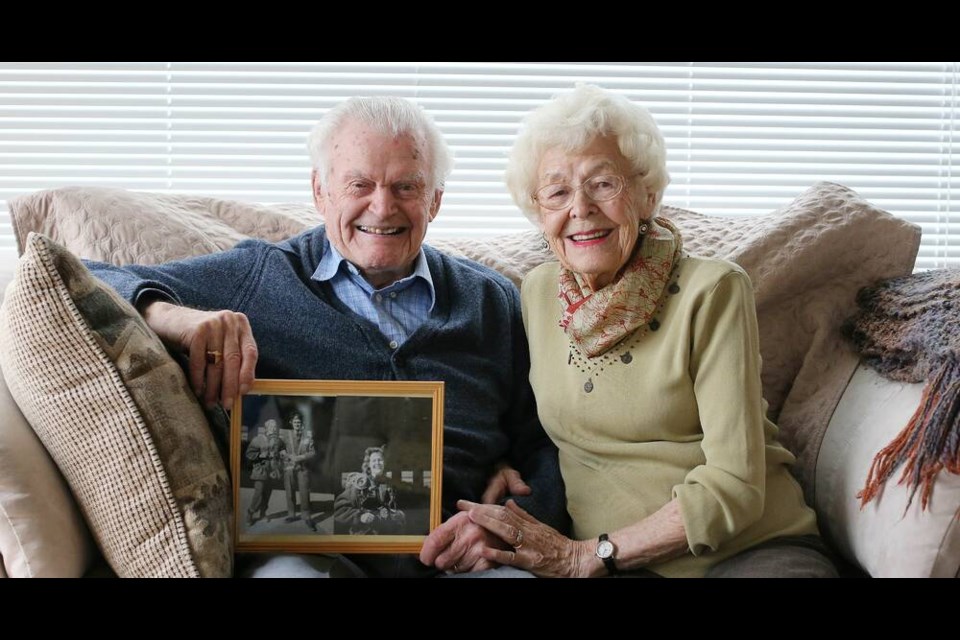Another one of the old boys died the other day.
Lew Duddridge almost made it all the way to 105, which is how long you have to live to pack in as much as he did.
He was a Prairie boy, a farmer, businessman and a bunch of other things who served as fire chief, school trustee and mayor in his hometown of Hanley, Sask., before retiring to Victoria in 1981 — though his idea of “retiring” stretched the definition of the word. He wrote four books, and he and his wife, Hilda, once spent eight months flying the edges of the continent with Lew at the controls and a motorcycle stuffed into their Cessna.
That wasn’t his only airborne experience. He logged 1,100 hours piloting Lancaster and Wellington bombers in the Second World War. Some of his experiences, like the time he flew with another pilot who nursed their flak-riddled bomber back to England with a chunk of the port wing missing and the fuel tanks punctured, are told in his book The Flying Duddridges of Hanley. Of the 13 Hanley boys who went overseas as air crew, Lew and his brother Len, also a pilot, were the only two to survive.
Lew was proud of his service — which meant he was royally ticked off when, several decades ago, a thief broke into the Duddridges’ Saskatchewan farmhouse and stole not just the Bible that his mother had given him (pause to consider what kind of skunk would steal a Bible) but also his old air force flying helmet.
“Thieves give me a pain in the arse,” Duddridge growled in 2014 while recalling the burglary.
Ah, but this story had a happy ending. The reason Duddridge was back then was that he had, out of the blue, just been contacted by a collector of military memorabilia in Saskatoon.
The collector, Rod Dignean, had purchased a helmet on eBay, buying it from a Californian who had obtained it from a friend who used to travel to sales of military gear in Vancouver. Written inside the headgear was “F/L L. Duddridge” and “RAF Cark,” the latter being Lew’s old air base in England’s Lake District.
A bit of Googling led Dignean, a school teacher and army reservist who had served in Afghanistan, to Duddridge. The latter was delighted.
“He thought it was such a kind thing to do,” Hilda recalled this week. “Lew was very moved by the fact that he went to all that trouble.”
In fact, Dignean’s gesture meant more to Duddridge than the helmet did. That’s why he told Dignean — who had spent a quarter century assembling a display of memorabilia that he toured around schools, armouries, Legions and the like — to keep it. “It was doing more good where [Dignean] had it,” Hilda said.
So, that’s where it is today, part of Dignean’s collection, which includes 60 uniformed mannequins and displays on Canada’s wars and such subjects as the Holocaust, the home front and — this is special to the Indigenous man — the contribution of First Nations. The Royal Canadian Air Force section includes Duddridge’s helmet and a signed copy of one of his books.
Actions like Dignean’s matter. As 98-year-old Hilda points out, a long life inevitably has its ups and downs. Dignean provided the Duddridges with an up.
Hilda . She was just out of her teens when she met Flight Commander Duddridge on an English railway platform in October 1944. Wed on April 2, 1945, they were together barely two months before he was sent back to Canada — not long enough to get used to married life, but long enough for Hilda to get pregnant.
When the 21-year-old disembarked from the Queen Mary in Halifax with their 3 1/2 month-old-daughter Glenys in her arms, Hilda hadn’t seen her husband for a year. When she reached flat, parched Saskatchewan, she knew she was a long, long way from the green hills of her native Wales.
That was just the start of what would be a 78-year adventure. You might recall reading about Lew and Hilda in 2020 when they ; pandemic protocols left them on opposite sides of the window of the care home into which he had moved at age 100. Hilda now allows that it was a relief when she eventually got to breach the barrier separating her from the love of her life.
Lew Duddridge died Jan. 4. It was a good life, Hilda says, made better along the way by those like Dignean.
“There are a lot of good people in the world, aren’t there?”



